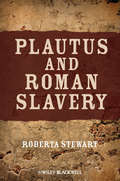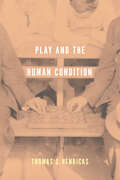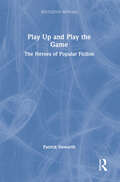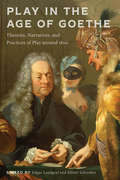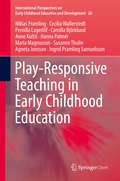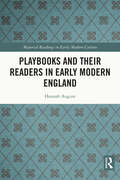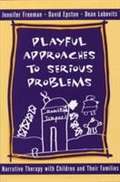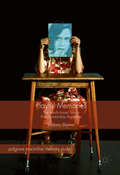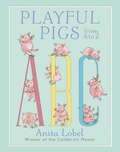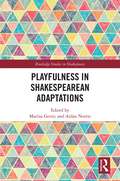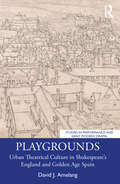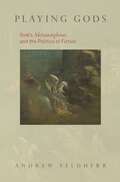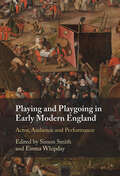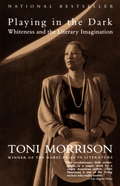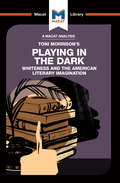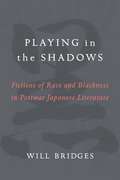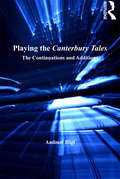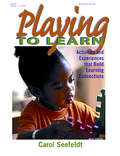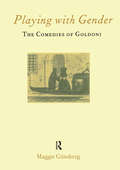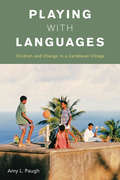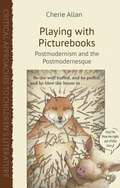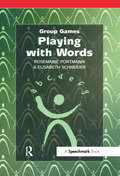- Table View
- List View
Plausible Prejudices: Essays on American Writing
by Joseph EpsteinA collection of essays on contemporary American literature, reprinted from various journals.
Plautus and Roman Slavery
by Roberta StewartThis book studies a crucial phase in the history of Roman slavery, beginning with the transition to chattel slavery in the third century bce and ending with antiquity’s first large-scale slave rebellion in the 130s bce. Slavery is a relationship of power, and to study slavery – and not simply masters or slaves – we need to see the interactions of individuals who speak to each other, a rare kind of evidence from the ancient world. Plautus’ comedies could be our most reliable source for reconstructing the lives of slaves in ancient Rome. By reading literature alongside the historical record, we can conjure a thickly contextualized picture of slavery in the late third and early second centuries bce, the earliest period for which we have such evidence. The book discusses how slaves were captured and sold; their treatment by the master and the community; the growth of the conception of the slave as “other than human,” and as chattel; and the problem of freedom for both slaves and society.
Play Reconsidered: Sociological Perspectives on Human Expression
by Thomas S. HenricksUnderstanding the significance of adult play in the life of modern societies Within the social sciences, few matters are as significant as the study of human play--or as neglected. In Play Reconsidered, rather than viewing play simply as a preoccupation of the young and a vehicle for skill development, Thomas S. Henricks argues that it’s a social and cultural phenomenon of adult life, enveloped by wider structures and processes of society. In that context, he argues that a truly sociological approach to play should begin with a consideration of the largely overlooked writings on play and play-related topics by some of the classic sociological thinkers of the twentieth century. Henricks explores Karl Marx’s analysis of creativity in human labor, examines Emile Durkheim’s observations on the role of ritual and the formation of collective consciousness, extends Max Weber’s ideas about the process of rationalization to the realm of expressive culture and play, surveys Georg Simmel’s distinctive approach to sociology and sociability, and discusses Erving Goffman’s focus on human conduct as process and play as “encounter.” These and other discussions of the contributions of more recent sociologists are framed by an initial consideration of Johan Huizinga’s famous challenge to understand the nature and significance of play. In a closing synthesis, Henricks distinguishes play from other forms of human social expression, particularly ritual, communitas, and work.
Play Up and Play the Game: The Heroes of Popular Fiction (Routledge Revivals)
by Patrick HowarthPlay Up and Play the Game (1973) examines the type of fictional hero most embodied in the work and character, poetry and philosophy of Sir Henry Newbolt. ‘Newbolt Man’, imbued with the spirit of fairplay, loyalty, fearlessness, conformity (while remaining slightly philistine and sexless), can be traced in the work of Rider Haggard, Conan Doyle, Edgar Wallace, Anthony Hope and P.C. Wren. The book traces his development from the Victorian schoolboy (Tom Brown’s School Days and Kipling) to the twentieth-century secret agent (Buchan’s Richard Hannay), and on to his demise in Sheriff’s Journey’s End and Aldington’s Death of a Hero.
Play in the Age of Goethe: Theories, Narratives, and Practices of Play around 1800 (New Studies in the Age of Goethe)
by Patricia Anne Simpson Michael Powers Christian P. Weber Samuel Heidepriem Nicholas Rennie Ian F. McNeely Christiane Frey David Martyn Brian TuckerWe are inundated with game play today. Digital devices offer opportunities to play almost anywhere and anytime. No matter our age, gender, social, cultural, or educational background—we play. Play in the Age of Goethe: Theories, Narratives, and Practices of Play around 1800 is the first book-length work to explore how the modern discourse of play was first shaped during this pivotal period (approximately 1770-1830). The eleven chapters illuminate critical developments in the philosophy, pedagogy, psychology, politics, and poetics of play as evident in the work of major authors of the period including Lessing, Goethe, Kant, Schiller, Pestalozzi, Jacobi, Tieck, Jean Paul, Schleiermacher, and Fröbel. While drawing on more recent theories of play by thinkers such as Jean Piaget, Donald Winnicott, Jost Trier, Gregory Bateson, Jacques Derrida, Thomas Henricks, and Patrick Jagoda, the volume shows the debates around play in German letters of this period to be far richer and more complex than previously thought, as well as more relevant for our current engagement with play. Indeed, modern debates about what constitutes good rather than bad practices of play can be traced to these foundational discourses. Published by Bucknell University Press. Distributed worldwide by Rutgers University Press.
Play-Responsive Teaching in Early Childhood Education (International Perspectives on Early Childhood Education and Development #26)
by Niklas Pramling Hanna Palmér Cecilia Wallerstedt Pernilla Lagerlöf Camilla Björklund Anne Kultti Maria Magnusson Susanne Thulin Agneta Jonsson Ingrid Pramling SamuelssonThis open access book develops a theoretical concept of teaching that is relevant to early childhood education, and based on children’s learning and development through play. It discusses theoretical premises and research on playing and learning, and proposes the development of play-responsive didaktik. It examines the processes and products of learning and development, teaching and its phylogenetic and ontogenetic development, as well as the ‘what’ of learning and didaktik. Next, it explores the actions, objects and meaning of play and provides insight into the diversity of beliefs about the practices of play. The book presents ideas on how combined research and development projects can be carried out, providing incentive and a model for practice development and research. The second part of the book consists of empirical studies on teacher’s playing skills and examples of play with very young as well as older children.
Playbooks and their Readers in Early Modern England (Material Readings in Early Modern Culture)
by Hannah AugustThis book is the first comprehensive examination of commercial drama as a reading genre in early modern England. Taking as its focus pre-Restoration printed drama’s most common format, the single-play quarto playbook, it interrogates what the form and content of these playbooks can tell us about who their earliest readers were, why they might have wanted to read contemporary commercial drama, and how they responded to the printed versions of plays that had initially been performed in the playhouses of early modern London. Focusing on professional plays printed in quarto between 1584 and 1660, the book juxtaposes the implications of material and paratextual evidence with analysis of historical traces of playreading in extant playbooks and manuscript commonplace books. In doing so, it presents more detailed and nuanced conclusions than have previously been enabled by studies focused on works by one author or on a single type of evidence.
Playful Approaches to Serious Problems: Narrative Therapy with Children and their Families
by David Epston Jennifer Freeman Dean LobovitsThe "grown-up talk" of therapy is likely to turn off children - especially if it focuses on their problematic behavior. The highly effective techniques of narrative therapy include children by respecting their unique language, stories, and views of the world. This book describes a basic theory of collaborative narrative play, as well as verbal and nonverbal techniques that clear the way for stories of hope, possibility, and change. Compelling case examples, drawn from the authors' work, will appeal to parents and educators as well as therapists.
Playful Memories
by Jordana BlejmarThis volume examines the blending of fact and fiction in a series of cultural artefacts by post-dictatorship writers and artists in Argentina, many of them children of disappeared or persecuted parents. Jordana Blejmar argues that these works, which emerged after the turn of the millennium, pay testament to a new cultural formation of memory characterised by the use of autofiction and playful aesthetics. She focuses on a range of practitioners, including Laura Alcoba, Lola Arias, Félix Bruzzone, Albertina Carri, María Giuffra, Victoria Grigera Dupuy, Mariana Eva Perez, Lucila Quieto, and Ernesto Semán, who look towards each other's works across boundaries of genre and register as part of the way they address the legacies of the 1976-1983 dictatorship. Approaching these works not as second-hand or adoptive memories but as memories in their own right, Blejmar argues that we need to recognise the subversive power of self-figuration, play and humour when dealing with trauma.
Playful Pigs from A to Z
by Anita LobelFrom Caldecott Honor winner Anita Lobel comes this delightful day, from A to Z. Twenty-six playful pigs wake in their pen ready for an adventure. They trot down a country road and discover a field full of surprises! There's an A for Amanda Pig to admire. A B for Billy Pig to balance on. And Clara Pig found a C that looks like it could use a good cleaning! By the time they return to their pen that night, the playful pigs have happily oinked their way through the alphabet.From the Hardcover edition.
Playfulness in Shakespearean Adaptations (Routledge Studies in Shakespeare)
by Marina Gerzic and Aidan NorrieFour hundred years after William Shakespeare’s death, his works continue to not only fill playhouses around the world, but also be adapted in various forms for consumption in popular culture, including in film, television, comics and graphic novels, and digital media. Drawing on theories of play and adaptation, Playfulness in Shakespearean Adaptations demonstrates how the practices of Shakespearean adaptations are frequently products of playful, and sometimes irreverent, engagements that allow new ‘Shakespeares’ to emerge, revealing Shakespeare’s ongoing impact in popular culture. Significantly, this collection explores the role of play in the construction of meaning in Shakespearean adaptations—adaptations of both the works of Shakespeare, and of Shakespeare the man—and contributes to the growing scholarly interest in playfulness both past and present. The chapters in Playfulness in Shakespearean Adaptations engage with the diverse ways that play is used in Shakespearean adaptations on stage, screen, and page, examining how these adaptations draw out existing humour in Shakespeare’s works, the ways that play is used as a pedagogical aid to help explain complex language, themes, and emotions found in Shakespeare’s works, and more generally how play and playfulness can make Shakespeare ‘relatable,’ ‘relevant,’ and entertaining for successive generations of audiences and readers.
Playgrounds: Urban Theatrical Culture in Shakespeare’s England and Golden Age Spain (Studies in Performance and Early Modern Drama)
by David J. AmelangThis book compares the theatrical cultures of early modern England and Spain and explores the causes and consequences not just of the remarkable similarities but also of the visible differences between them. An exercise in multi-focal theatre history research, it deploys a wide range of perspectives and evidence with which to recreate the theatrical landscapes of these two countries and thus better understand how the specific conditions of performance actively contributed to the development of each country’s dramatic literature. This monograph develops an innovative comparative framework within which to explore the numerous similarities, as well as the notable differences, between early modern Europe’s two most prominent commercial theatre cultures. By highlighting the nuances and intricacies that make each theatrical culture unique while never losing sight of the fact that the two belong to the same broader cultural ecosystem, its dual focus should appeal to scholars and students of English and Spanish literature alike, as well as those interested in the broader history of European theatre. Learning from what one ‘playground’ – that is, the environment and circumstances out of which a dramatic tradition originates – reveals about the other will help solve not only the questions posed above but also others that still await examination. This investigation will be of great interest to students and scholars in theatre history, comparative drama, early modern drama, and performance culture.
Playing Gods: Ovid's Metamorphoses and the Politics of Fiction
by Andrew FeldherrThis book offers a novel interpretation of politics and identity in Ovid's epic poem of transformations, the Metamorphoses. Reexamining the emphatically fictional character of the poem, Playing Gods argues that Ovid uses the problem of fiction in the text to redefine the power of poetry in Augustan Rome. The book also provides the fullest account yet of how the poem relates to the range of cultural phenomena that defined and projected Augustan authority, including spectacle, theater, and the visual arts. Andrew Feldherr argues that a key to the political as well as literary power of the Metamorphoses is the way it manipulates its readers' awareness that its stories cannot possibly be true. By continually juxtaposing the imaginary and the real, Ovid shows how a poem made up of fictions can and cannot acquire the authority and presence of other discursive forms. One important way that the poem does this is through narratives that create a "double vision" by casting characters as both mythical figures and enduring presences in the physical landscapes of its readers. This narrative device creates the kind of tensions between identification and distance that Augustan Romans would have felt when experiencing imperial spectacle and other contemporary cultural forms. Full of original interpretations, Playing Gods constructs a model for political readings of fiction that will be useful not only to classicists but to literary theorists and cultural historians in other fields.
Playing Hesiod
by Helen Van NoordenThis book offers a new description of the significance of Hesiod's 'myth of the races' for ancient Greek and Roman authors, showing how the most detailed responses to this story go far beyond nostalgia for a lost 'golden' age or hope of its return. Through a series of close readings, it argues that key authors from Plato to Juvenal rewrite the story to reconstruct 'Hesiod' more broadly as predecessor in forming their own intellectual and rhetorical projects; disciplines such as philosophy, didactic poetry and satire all engage in implicit questions about 'Hesiodic' teaching. The first chapter re-evaluates the account in Hesiod's Works and Days. A major chapter outlines Plato's use of Hesiod through close study of the Protagoras, Republic and Statesman. Subsequent chapters focus on Aratus' Phaenomena and Ovid's Metamorphoses; the final chapter, on the Octavia attributed to Seneca and Juvenal's sixth Satire, broadens ideas of Hesiod's reception in Rome.
Playing and Playgoing in Early Modern England: Actor, Audience and Performance
by Simon Smith Emma WhipdayThis edited collection of essays brings together leading scholars of early modern drama and playhouse culture to reflect upon the study of playing and playgoing in early modern England. With a particular focus on the player-playgoer exchange as a site of dramatic meaning-making, this book offers a timely and significant critical intervention in the field of Shakespeare and early modern drama. Working with and reflecting upon approaches drawn from literary scholarship, theatre history and performance studies, it seeks to advance the critical conversation on the interactions between: players; play-texts; performance spaces; the bodily, sensory and material experiences of the playhouse; and playgoers' responses to, and engagements with, the theatre. Through alternative methodological and theoretical approaches, previously unknown or overlooked evidence, and fresh questions asked of long-familiar materials, the volume offers a new account of early modern drama and performance that seeks to set the agenda for future research and scholarship.
Playing in the Dark: Whiteness and the Literary Imagination (The\william E. Massey Sr. Lectures In The History Of American Civilization Ser. #1992)
by Toni MorrisonThe Pulitzer Prize-winning author of Beloved and Jazz now gives us a learned, stylish, and immensely persuasive work of literary criticism that promises to change the way we read American literature even as it opens a new chapter in the American dialogue on race.<P><P> Toni Morrison's brilliant discussions of the "Africanist" presence in the fiction of Poe, Melville, Cather, and Hemingway leads to a dramatic reappraisal of the essential characteristics of our literary tradition. She shows how much the themes of freedom and individualism, manhood and innocence, depended on the existence of a black population that was manifestly unfree--and that came to serve white authors as embodiments of their own fears and desires.<P> Written with the artistic vision that has earned Toni Morrison a pre-eminent place in modern letters, Playing in the Dark will be avidly read by Morrison admirers as well as by students, critics, and scholars of American literature.
Playing in the Dark: Whiteness in the American Literary Imagination
by Adam Perchard Karina JakubowiczToni Morrison’s Playing in the Dark: Whiteness and the Literary Imagination is a seminal piece of literary criticism, and a masterclass in the critical thinking skill of interpretation. Interpretation plays a vital role in critical thinking: it focuses on interrogating accepted meanings and laying down clear definitions on which a strong argument can be built. Both history and literary history in the US have frequently revolved around understanding how Americans define themselves and each other, and Morrison’s work seeks to investigate, question, and redefine one of the central concepts in American history and American literary history: color.. Morrison turned to the classics of American literature to ask how authors had chosen to define the terms ‘black’ and ‘white.’ Instead of accepting traditional interpretations of these works, Morrison examined the way in which ‘whiteness’ defines itself through ‘blackness,’ and vice versa. Black bondage and the myths of black inferiority and savagery, she showed, allowed white America to indulge its own defining myths – viewing itself as free, civilized, and innocent. A classic of subtle and incisive interpretation, Playing in the Dark shows just how crucial and how complex simple-looking definitions can be.
Playing in the Shadows: Fictions of Race and Blackness in Postwar Japanese Literature (Michigan Monograph Series in Japanese Studies #88)
by William BridgesPlaying in the Shadows considers the literature engendered by postwar Japanese authors’ robust cultural exchanges with African Americans and African American literature. The Allied Occupation brought an influx of African American soldiers and culture to Japan, which catalyzed the writing of black characters into postwar Japanese literature. This same influx fostered the creation of organizations such as the Kokujin kenkyu no kai (The Japanese Association for Negro Studies) and literary endeavors such as the Kokujin bungaku zenshu (The Complete Anthology of Black Literature). This rich milieu sparked Japanese authors’—Nakagami Kenji and Oe Kenzaburo are two notable examples—interest in reading, interpreting, critiquing, and, ultimately, incorporating the tropes and techniques of African American literature and jazz performance into their own literary works. Such incorporation leads to literary works that are “black” not by virtue of their representations of black characters, but due to their investment in the possibility of technically and intertextually black Japanese literature. Will Bridges argues that these “fictions of race” provide visions of the way that postwar Japanese authors reimagine the ascription of race to bodies—be they bodies of literature, the body politic, or the human body itself.
Playing the Canterbury Tales: The Continuations and Additions
by Andrew HiglPlaying the Canterbury Tales addresses the additions, continuations, and reordering of the Canterbury Tales found in the manuscripts and early printed editions of the Tales. Many modern editions present a specific set of tales in a specific order, and often leave out an entire corpus of continuations and additions. Andrew Higl makes a case for understanding the additions and changes to Chaucer's original open and fragmented work by thinking of them as distinct interactive moves in a game similar to the storytelling game the pilgrims play. Using examples and theories from new media studies, Higl demonstrates that the Tales are best viewed as an "interactive fiction," reshaped by active readers. Readers participated in the ongoing creation and production of the tales by adding new text and rearranging existing text, and through this textual transmission, they introduced new social and literary meaning to the work. This theoretical model and the boundaries between the canonical and apocryphal texts are explored in six case studies: the spurious prologues of the Wife of Bath's Tale, John Lydgate's influence on the Tales, the Northumberland manuscript, the ploughman character, and the Cook's Tale. The Canterbury Tales are a more dynamic and unstable literary work than usually encountered in a modern critical edition.
Playing the Farmer
by Philip ThibodeauPlaying the Farmer reinvigorates our understanding of Vergil's Georgics, a vibrant work written by Rome's premier epic poet shortly before he began the Aeneid. Setting the Georgics in the social context of its day, Philip Thibodeau for the first time connects the poem's idyllic, and idealized, portrait of rustic life and agriculture with changing attitudes toward the countryside in late Republican and early Imperial Rome. He argues that what has been seen as a straightforward poem about agriculture is in fact an enchanting work of fantasy that elevated, and sometimes whitewashed, the realities of country life. Drawing from a wide range of sources, Thibodeau shows how Vergil's poem reshaped agrarian ideals in its own time, and how it influenced Roman poets, philosophers, agronomists, and orators. Playing the Farmer brings a fresh perspective to a work that was praised by Dryden as "the best poem by the best poet."
Playing to Learn: Activities and Experiences that Build Learning Connections
by Carol SeefeldtCreate meaningful experiences and engage children in learning through play. Playing to Learn gives you hundreds of activities to make learning fun through games, small group activities, stories, and more. These games and activities promote learning every day of the week, every week of the year. Sure to become a classroom favorite, Playing to Learn has everything you need to create wonderful learning experiences for young children.
Playing with Gender: The Comedies of Goldoni
by Maggie Gunsberg"This work takes gender as its point of entry into the comedies of Carlo Goldoni (1707-93). The dramatization of femininity and masculinity is explored in conjunction with that of other social categories (class, the family, and age). The plays reinforce the patriarchal association of femininity with the body, with spectacle, and with theatricality, while the dramatic backdrop of Venice and carnival provides a context for the staging of issues relating to identity, disguise and fashion. In the plays, pretence and theatricality vie with bourgeois Enlightenment values of morality, honesty and respectability to produce dramatic tension with distinct gender implications."
Playing with Languages
by Amy L. PaughOver several generations villagers of Dominica have been shifting from Patwa, an Afro-French creole, to English, the official language. Despite government efforts at Patwa revitalization and cultural heritage tourism, rural caregivers and teachers prohibit children from speaking Patwa in their presence. Drawing on detailed ethnographic fieldwork and analysis of video-recorded social interaction in naturalistic home, school, village and urban settings, the study explores this paradox and examines the role of children and their social worlds. It offers much-needed insights into the study of language socialization, language shift and Caribbean children's agency and social lives, contributing to the burgeoning interdisciplinary study of children's cultures. Further, it demonstrates the critical role played by children in the transmission and transformation of linguistic practices, which ultimately may determine the fate of a language.
Playing with Picturebooks
by Cherie AllanOffers new insights into the continuing influence of postmodernism on a wide range of international picture books for children published between 1963 and 2008. Its chapters include metafiction; disruption to narrative conventions; interrogation of 'truths'; historiographic metafiction; difference and ex-centricity; globalisation and media.
Playing with Words (Group Games Ser.)
by Rosemary Portmann Elisabeth SchneiderWith an emphasis on learning through play, this book provides a comprehensive collection of word games for vocabulary development or to constructively fill leisure time. The activities are suitable for children and adults and can be adapted for different client groups. They are ideal for teachers, therapists, youth club leaders or activity providers. The only principle for including a game in this collection is that it had to be fun to play! This title includes: A-E-I-O-U; Letter patience; 'M' in the middle; double meanings; Pro-nouns; Haiku; Guessing rhyming words; Forbidden letters; Who has the word?; and Word snakes. The only principle for including a game in this collection is that it had to be fun to play!

